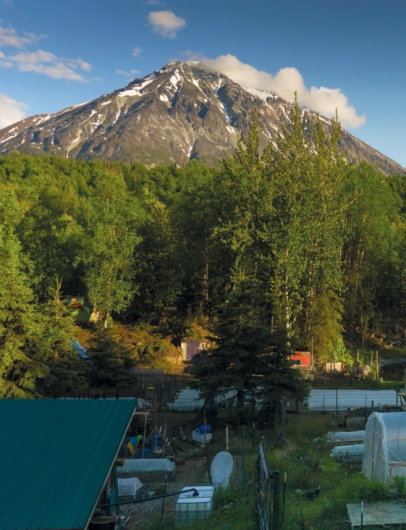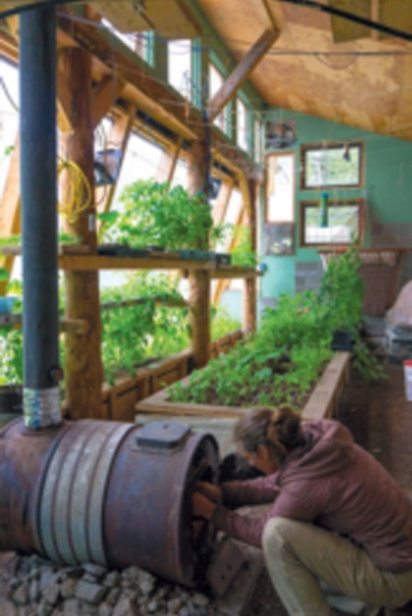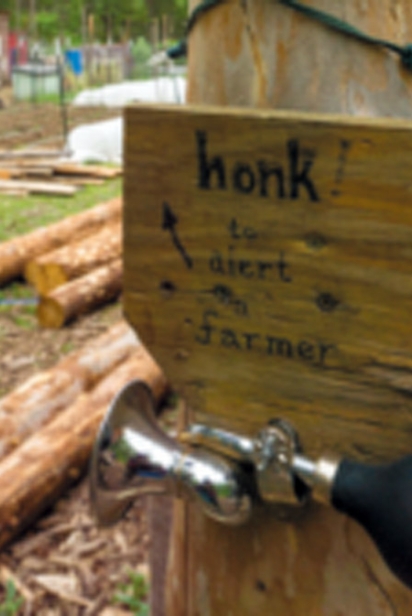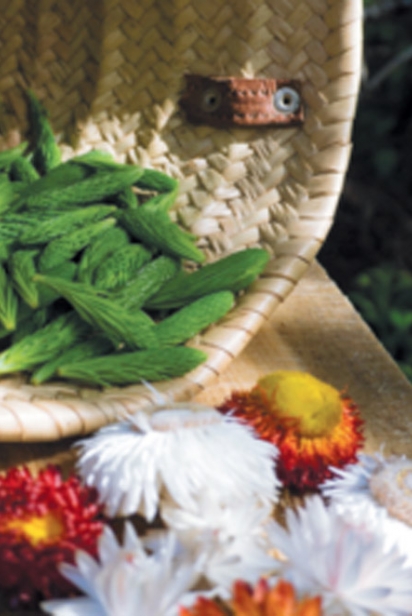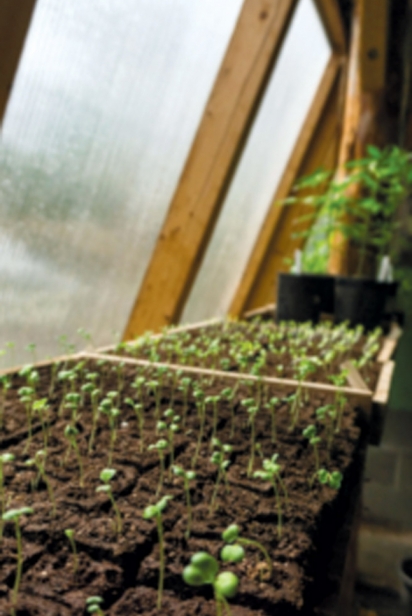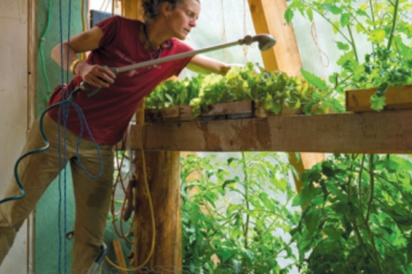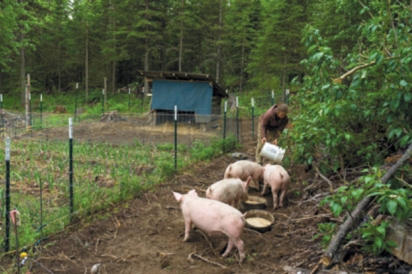Big Vegetables Big Mountains
Living the Good life at Chugach Farm
One of the more remote towns along the Glenn Highway is Chickaloon, a tiny village of fewer than 300 people tucked into a spectacular corridor of glacier-filled valleys and snow-covered peaks. The Talkeetna Mountains rise up out of the north, and the Chugach Range dominates the south.
This is the backdrop of Chugach Farm, home base for Allie Barker and Jed Workman, two local legends who have united their passions for mountain adventure and self-reliance. They have lived and grown food in this forested mountain paradise for over sixteen years. The three acre off-the-grid homestead is situated on an esker, a ridge of silt and gravel deposited by retreating glaciers. On one cultivated acre of land, the husband-wife team produce enough food to feed themselves all year, plus apprentices and volunteer helpers. The farm also supplies produce to a few restaurants, a small community supported agriculture (CSA) program, and farmers market customers.
Yet it was the mountains, not farming, that drew both Allie and Jed here. Allie first came to Alaska on a ski mountaineering trip when she was 18 years old. “I fell in love with the place and decided this is where I’ll spend the rest of my life,” she recalls. She began her career as a mountain guide and met Jed on a training course in the Chugach. Ever since then, the two have built successful careers as mountain guides, outdoor instructors, and professional avalanche specialists.
Over the years, Jed and Allie have also set deep roots in their community as they have gradually built their homestead and farm business. They generously share their knowledge and skills with neighbors and friends who regularly volunteer on the farm, and offer workshops and apprenticeships.
This year will be the farm’s 10th year at the Spenard Farmers Market in downtown Anchorage. Customers can find Allie each Saturday in the summer with an array of vegetables, ferments, kombucha, herbal vinegars, fire cider, and other remedies made from garden medicinals and wildcrafted plants. Allie also started Alaska’s first Community Supported Ferments (CSF) program that offers a wide range of culinary combinations and flavors, from classic sauerkraut and kimchi to curtido and chutney. “We’ve grown and harvested everything, and it’s really seasonal,” says Allie. “The CSF is an opportunity for people to try different fermented foods, understand the process, how it’s made, how it can be made safe, and how food was naturally preserved by humanity for a very long time by our ancestors until refrigerators came along.”
Tall, trim, and exceedingly strong, Allie is built like a steel cable. Her physical strength, combined with the discipline and endurance of a mountaineer, has allowed her to transform a desire for a self-sufficient lifestyle into an inspiring reality. “I read Helen and Scott Nearing’s The Good Life as a teenager,” she shares. “This couple survived the Great Depression in style.” Time is more valuable than money at Chugach Farm. Allie and Jed do as much as they can with their own labor and energy. They buy what they need out of pocket and make good use of salvaged and repurposed materials along with locally-milled wood.
Eating high quality food for optimal health has always been a major motivator for Allie. Even when they were both guiding fulltime, much of the couple’s diet came from food that they grew, hunted, gathered, or fished. Allie estimates that 99% of what they eat is grown or harvested by their own efforts. Homegrown vegetables and ferments are stored in a massive root cellar shaped like a miniature mountain. Despite the responsibilities of the farm, they still manage to prioritize subsistence activities that connect them to the land and store for winter.
“There are very few places in the world where you can live how we live, where you don’t have so many barriers,” observes Allie. “We are fortunate that we are able to be creative where we are. I can come up with an idea today and tomorrow we can start building it.” Seasons and Systems
All winter, the pair run the Hatcher Pass Avalanche Center. As professional avalanche specialists, they ski out in the mountains of Hatcher Pass to conduct scientific measurements and observations used to issue public safety advisories. As the days begin to lengthen in early spring, Allie and Jed face the challenge of balancing their mountain life with firing up their systems for a new season of growing food. In winter, wood is the primary source of power and heat for the off-the-grid system. The transition to starting seedlings involves logging and keeping wood stoves going.
The first stove to be lit is in the seed house, where wood is loaded in the morning and at night. This energy efficient structure was designed by Allie and Jed with home-milled wood and built for less than $200. The north wall is insulated while south-facing windows let in light for thousands of seedlings packed onto shelves. Barrels of water provide an effective heat sink. “It can be 20 below out and it’s still 70 degrees in there,” says Allie.
When the seedlings are big enough, they move into the greenhouse. Also designed by Allie and Jed, the greenhouse is built into the hillside and is at least three times bigger than their cabin. It was Allie’s dream to build this earth-ship-style greenhouse after studying with Ana Edey at Evergreen State College. Allie was awarded an Alaska Agriculture Innovation Grant (AAIG) from the state’s Division of Agriculture to help with the building costs, which made it possible for her dream to come true. Similar to the seed house, the greenhouse’s northern wall is insulated, in this case, by the ground. Triple-pane polycarbonate windows form the south wall.
The fire in the woodstove is kept going from March until early June. Passive solar heat keeps the structure warm until they start the fires up again in the fall. “We’ve picked peppers in the beginning of December, even though we lose the light on November 18th behind King Mountain,” says Allie.
A radiant heat system circulates under the beds to keep the young plants cozy inside despite the freezing temperatures outside. Baby chickens and ducklings also live in here until it is warm enough for them to move outdoors.
Getting into the Zones
Chugach Farm is deliberately off-the-grid. All systems run on a combination of wood, solar, animal, and (super) human power. Allie and Jed’s cabin and other structures were built using wood they cut and chainsaw-milled themselves. The cultivated land is divided into a patchwork of zones, each named after a different mountain range and separated by fencing and repurposed ski equipment. A multi-year rotation of cover crops, chickens, and pigs has transformed the nutrient-poor silt into deep soil rich in organic matter.
As the spring days lengthen into summer, more of the farm comes alive. Solar panels collect energy from the sun to charge a battery bank. This system pumps well water to storage tanks on the hill, supplying a gravity-fed drip irrigation system that flows to all the growing zones. Young plants that outgrow the greenhouse are transferred to hoop houses or high tunnels. After snowmelt and soil prep, the field crops get planted. Wriggling earthworms can be found in each handful of soil, a testament to the soil fertility. Healthy soils yield healthy foods.
During the day, the gates to the chicken coops and duck houses are open while the gates to the growing zones are closed. Free range chicken and ducks are the clean-up crew that transform bugs and plant scraps into multicolor eggs for market.
While the animals provide a direct source of food, they are also important participants in shaping the land and improving the soil. They raise pigs in a forested section of the farm that will become a new planting zone. The pigs dig around with their hooves and snouts, uprooting tree roots, aerating the soil, and leaving fertilizer behind. “It takes longer to clear the forest because you’re using pigs instead of machinery, but they do a way better job,” explains Allie. “If you’re patient,” she adds with a grin.
Resilience
Life on the homestead is a constant juggle of tasks, problem-solving and planning the next project. Like a trapper on a trapline, the couple traverses every square inch of the homestead, inspecting and adjusting all that is in their path. Challenges are welcomed as opportunities to gain new skills and become experts on any given topic that presents itself. “Guiding on Denali was easy compared to farming,” laughs Allie. “Mountaineering has taught us so much. We’re good at adapting. We just do what we need to do to get the work done to achieve our goals.”
Despite their demonstrated expertise in farming, building, designing energy systems, running a business, and more, the couple emphasizes that anyone can do what they do if they are willing to put in the hard work. “It’s not like we were builders,” says Allie, referring to the time when they first began their homestead. They had to learn on their own everything that they needed to know. “We’ve kind of just rolled with not knowing all the details,” adds Jed. “I never did any of this stuff before, so I had to have the faith that things would work out.”
Like Allie, Jed Workman is tall, slim, strong, and always on the move. He has a long bushy beard and kind eyes that twinkle like glacial ice on a sunny day. With an easygoing, good humored style, Jed is a phenomenal problem solver, whether it be guiding clients off a summit in a blizzard, or repairing a solar-powered water pump system. “Every day something breaks,” laughs Allie. “When something goes wrong, you can’t call someone. You just have to do it. We’ve rebuilt everything on the farm.”
The partnership between Allie and Jed is key to the farm’s high yield on a small footprint. “We guided together in the mountains for 10 years before we started this,” shares Allie. “It’s a lot of close time either tied together with a rope, or in a tent. We’ve been each other’s best friends, looking out for each other, for 18 years.” Allie is the dreamer and the idea master while Jed is the encouraging supporter and “figure-outer,” as Allie describes. “I say that I’ve been thinking of an idea, and Jed says, ‘do it!’ Our biggest asset is that we make stuff happen.”
Living Legacy
Sweet aromatics of the forest mingle with wood smoke drifting from the greenhouse. On the fringes, fresh spring undergrowth glows green under massive cottonwood, aspen, and spruce trees. Songbirds call out in the trees while the rooster crows over the quacking ducks. Chugach Farm is at once forest and farm, mountain and vegetable, human and animal powered. Allie and Jed’s small-scale farm makes a big impact by providing ethically-produced local food and inspiring others to also live a lifestyle that aligns with the values of self-sufficiency, good health, and taking care of the earth. “You don’t have to have a big piece of land,” Allie points out. “We lose part of the sun part of the year to the mountains, and we’re still making it work.”
More ambitious projects are underway at Chugach Farm as Allie and Jed continue to embrace the challenges, rewards, and most importantly, the freedom to live the good life. “It’s been instilled in me that if you have the passion and the desire and motivation to create and do good things, you can,” says Allie, “and you will.”


